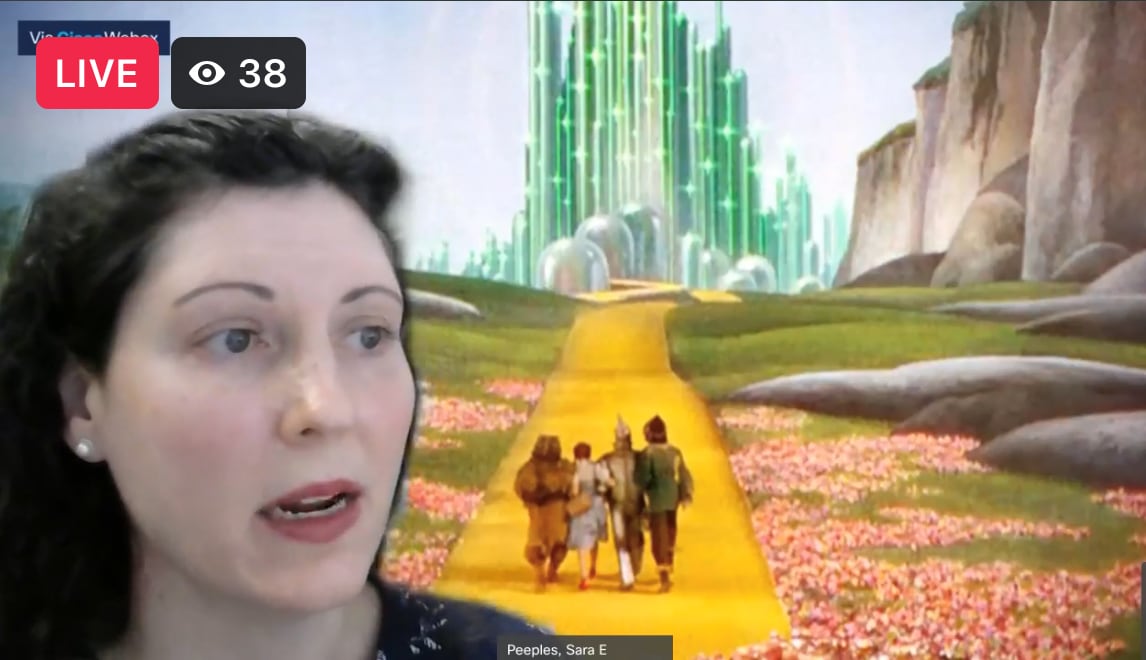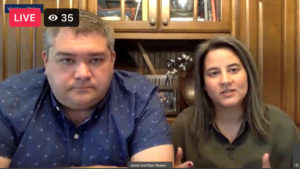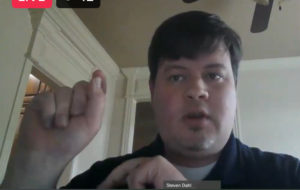View Larger Image

Sara Peeples, M.D., helps moderate the virtual NICU Reunion.
Virtual NICU Reunion Keeps Graduates and Families United and Informed
| Sara E. Peeples, M.D., medical director of the Neonatal Intensive Care Unit (NICU) at the University of Arkansas for Medical Sciences (UAMS), moderated a virtual NICU Reunion on April 24, with a scene from The Wizard of Oz as her background. She was joined by Becky Sartini, assistant nursing director for the inpatient women and infant service line.
Although the virtual nature of the event meant there were no actual visitors to the magical place where some of the participants developed as tiny human beings, and no actual hugs were exchanged with the doctors and nurses who helped them on their journey, former NICU patients and their family members nevertheless were welcomed “home.”
The theme of the 10th Annual NICU Reunion was “There’s no place like home,” as Dorothy memorably repeated while tapping her sparkly ruby red slippers together at the direction of Glinda the Good Witch in the 1939 film classic.
But at this two-hour reunion over Facebook Live, the NICU graduates, their families and caregivers shared memories and greetings through comments that were visible on the lower half of the participants’ computer screens, below the image of Dorothy skipping toward Oz on the yellow brick road.
“My child was a micro-preemie there almost 23 years ago,” one mother announced, generating a flurry of hearts and flowers in response.
Meanwhile, doctors and nurses from UAMS shared helpful information for the audience and answered written questions from the virtual participants.
For starters, Steven Dahl, M.D., a pediatric infectious diseases specialist, gave a kid-friendly explanation of COVID-19 while displaying pictures of the virus responsible for the ongoing pandemic. Last year’s reunion was canceled altogether because of the pandemic.
Dahl urged kids 16 and older, as well as their family members, to get one of the available vaccines, and explained in detail how they work, using diagrams and pictures. He answered questions about whether the vaccines are safe for pregnant or breast-feeding mothers (no adverse effects have been seen, and maternal antibodies that cross into the baby’s body can help protect the newborn from infection), what the most common side-effects are, and whether someone with an underlying condition should get one (“absolutely”).
Dahl said older family members can help protect children younger than 16, for whom the vaccines aren’t yet authorized, by getting the vaccine themselves. He explained it like this: “I’ve been vaccinated, so my kids are less likely to get the coronavirus because I’m less likely to give it to them.”
Heather Smith, UAMS’ child safety coordinator, shared safety tips aimed at dangers around the home, playtime for babies and toddlers, and car seats. She held up different types of car seats, explaining which are best for which ages and sizes of kids, and demonstrated how to use them. She also warned parents against a tendency to “graduate your child to a safety belt too early,” saying even kids ages 8 to 12 need the protection of forward-facing travel seats.
While she talked, Smith kept watchers busy answering safety questions for prizes.
Rounding out the virtual gathering were Jared Beavers, M.D., and Blair Beavers, M.D., a husband and wife team of pediatricians at UAMS who talked about parenting strategies.
“Ohh how we love them both!” wrote a virtual participant, Samantha Paige, as the couple appeared onscreen from home sitting in front of their computer.
The doctors emphasized the need for parents to be consistent about what their children are expected to do and not do, and to use discipline consistently, to avoid setting their kids up for failure. It’s also important to “pick your battles,” they said.
“One of our kids wanted to sleep with their shoes on at 2 years old,” Blair Beavers said. Shrugging, she added, “It was fine with me. That wasn’t a battle we wanted to fight.”

Jared Beavers, M.D., and his wife, Blair Beavers, M.D., jointly discuss tips about raising children.
Enforcing other habits is important, they said, urging parents to decide what’s important to them: Will the entire family sit at the table every night? Will everyone have to leave their mobile phone behind while going out for dinner? Must everyone wear a helmet every time they get on a bike or scooter?
As for bedtime rules, they said, it isn’t practical to insist that children are in bed too close to when the family usually arrives home from going out to dinner, leaving little time for baths and other rituals.
“You need to figure out what your kids’ schedule is going to be and be their advocate,” Blair Beavers said.
Jared Beavers said rules like not allowing kids to eat certain types of food after certain hours must be enforced.
“That consistency is actually very important for them,” he said. Acknowledging that rules can slacken as the kids get older, he emphasized that when they’re young, “having that consistency is like a warm cozy blanket to kids.”
At the same time, he said, “you don’t need pages and pages” of rules. The rules should be “just for the important things.”
He cautioned parents to establish habits early, noting, “About the time they start to smile, which is about two months of age, they are master manipulators,” and that parents need to be on guard against children’s natural, though not malicious, tendencies to play one parent against another.
At another point, Beavers told parents, “you should never, ever discipline for potty accidents. That will cause all kinds of problems down the road. Potty training should be encouraged and rewarded.”
Former NICU families praised the doctors and nurses at UAMS.
“Hey from Caroline and the Craver crew,” one participant wrote. “We are forever grateful to all the nurses and doctors at UAMS.”
“I love UAMS!” wrote Lauren Hurst. “My son was born there at 30 weeks and is now 9 and almost taller than me, and on a fifth-grade level in the third grade! Thank y’all so much!”
A post from Debbie Jackson followed. She announced that “26 years ago today, I gave birth to a 2-pound, 12-ounce baby girl at UAMS! She’s doing fabulous, and we owe a lot to the doctors and nurses who cared for her for the first 46 days of her life! Thank you!”
The final presentation of the day was a brief history of the Angel Eye cameras and technology, celebrating its 15th year anniversary this year. Sarah Rhoads, Ph.D., APRN, shared her professional and personal involvement with Angel Eye, along with a video message for families. The video, along with a full recording of all the presentations, is available by logging onto Facebook and visiting the UAMS NICU Reunion page.
Next year, Peeples said, organizers hope the reunion can get back to being held in person.
“We love and miss all of you so much,” she said.
